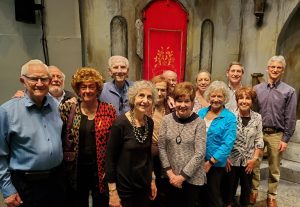Holes in the Roof – A Weekly Letter from Rabbi Davis – May 10, 2019
Shalom Chaverim
Last Sunday, I had the opportunity to accompany over a dozen Beth El members to see the current production of the Minnesota Jewish Theater Company*, Shul. Sponsored by The Well, we found the story all-too-familiar.
 Shul, a play by Sheldon Wolf, tells the story of a dying synagogue. Etz Chaim has only a handful of mostly older members, not enough for a minyan. They are proud of their beloved synagogue and so they hold on to cherished memories. But they have no future. The building is falling apart, they can’t afford the upkeep, and they can’t agree on what to do. Where some see holes in the roof, others see windows to the heavens. When an opportunity to sell the building arises, the motley congregation must decide if they are going to disband or forge ahead.
Shul, a play by Sheldon Wolf, tells the story of a dying synagogue. Etz Chaim has only a handful of mostly older members, not enough for a minyan. They are proud of their beloved synagogue and so they hold on to cherished memories. But they have no future. The building is falling apart, they can’t afford the upkeep, and they can’t agree on what to do. Where some see holes in the roof, others see windows to the heavens. When an opportunity to sell the building arises, the motley congregation must decide if they are going to disband or forge ahead.
This world premier accurately captures the dilemma faced by many houses of worship including synagogues and churches. Reports of the decline in religious affiliation in America are well-known. But it does not necessarily correspond to a decline in interest in spiritual life. You don’t have to look far to see evidence of this changing landscape in our Twin Cities’ Jewish community. On the one hand, there have been synagogues that have closed or merged (think of B’nai Emet). On the other hand, there are groups of mostly younger Jews who are creating new facets of the Jewish community through social justice work, independent minyanim, etc.
Here at Beth El, our synagogue is hardly dying. It is thriving. Our calendar and our building are often so full that there is no room for additional programs. On the other hand, we do face some of the same challenges as Shul. Earlier this week, the roof was leaking into one of the administration hallways. I didn’t see a hole to reach heaven; I saw water coming in. Even more pressing, we have a budget deficit this year and another projected for the coming year.
You will be receiving a letter in the coming weeks that explains our financial situation. It explains the positive impact of the new voluntary giving model and how we still need your continued support.
We read in our parasha this week, “observe My shabbat and show reverence for My sanctuary” (Lev. 19:30). There are many ways to understand this verse. I take it to mean that we show reverence for the synagogue davka by filling it on shabbat with words of Torah, with prayers, and with a vital, active community. At the same time, we show respect by ensuring the fiscal health of the congregation and by maintaining the physical plant.
In Shul, members of the synagogue, deeply invested in the fate of their congregation feel responsible for ensuring its future. No less is required for our own shul.
Bivrakha,
Rabbi Alexander Davis
adavis@bethelsynagogue.org
*The Twin Cities is blessed to have The Minnesota Jewish Theater Company, one of the only independent Jewish theater companies in the US.
